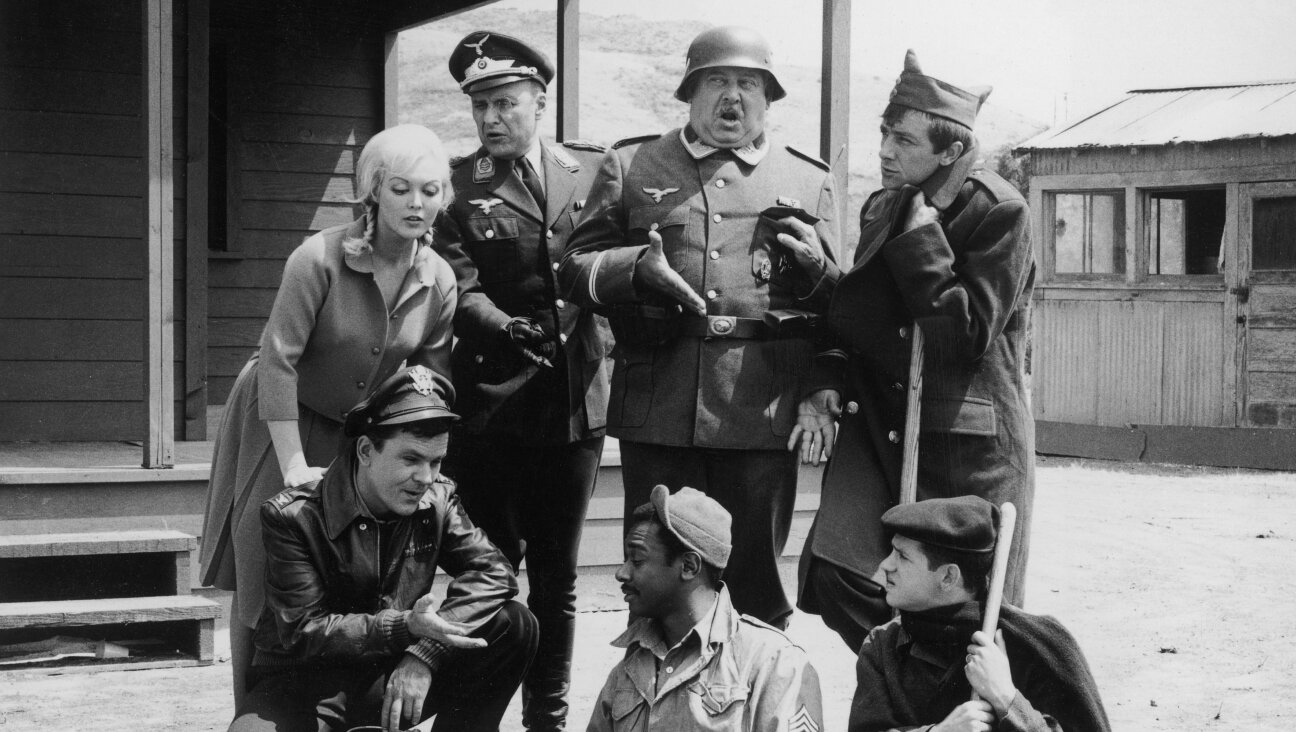‘Straight Outta Compton’ Is Surprisingly Good to the Jews

Image by Universal and Legendary
One of the more surprising aspects of “Straight Outta Compton” — F. Gary Gray’s propulsive and vibrant, if rather disjointed, film about the rise and fall of the seminal rap group N.W.A — is how dainty it is when it comes to portraying Jews and anti-Semitism.
Whatever its merits and shortcomings, like the music it celebrates, this is not what you would call a timid movie. Baseball bats are taken to glass furniture; actors drop F-bombs as if they were conjunctions and articles; Death Row Records co-founder Suge Knight administers a vicious beat-down to someone who takes his parking space. And then, of course, there are the songs — still incendiary more than 20 years after they exploded onto the American consciousness and became the soundtrack for everyone from disenfranchised urban teens in South Central Los Angeles and on the West Side of Chicago to posturing white boys on elite college campuses, wearing turned-around baseball caps at keggers and chanting, “I’m the type of ni—a that’s built to last / You f—k with me, I’ll put my foot in your ass,” at their whites-only fraternities.
What was I listening to in the summer of 1989? Well, yes, Bob Dylan released “Oh Mercy” that year, and I just about wore out my Bob Mould, Tracy Chapman and Pogues cassettes, but for sheer visceral impact, it was hard to beat blasting “You’d rather see me in the pen / than me and Lorenzo rollin’ in a Benz-o,” even if you happened to be rolling in a crappy Ford Escort on the mean streets of Chicago’s northern suburbs. In fact, I was introduced to the stylings of Dr. Dre, MC Ren, Ice Cube and Eazy-E by my best friend, a white dude who at the time was serving as a public safety officer in the bad-ass suburb of Glencoe and used to play “F—k the Police” en route to his shifts.
I didn’t know many women who listened to N.W.A, though. A brief conversation I had with a young woman that summer still resonates: “What music do you like to listen to?” she asked me. “Have you ever heard of N.W.A?” I asked. “Yes,” she said. “They’re assholes.”
The fact that the misogyny and homophobia in N.W.A’s lyrics has been written about and discussed so extensively doesn’t make it any less problematic. The references to bitches and ho’s may be de rigueur for the genre, but that doesn’t make them any more palatable; hearing them 25 years later gives me the same queasy, self-critical, I-feel-like-I-live-in-my-parents’-basement-and-consume-Cheetos-and-Strawberry-Nehi-and-read-far-too-many-comic-books-and-have-a-subscription-to-Penthouse sensation I get when I try to listen to the Rolling Stones’ “Under My Thumb” or to re-watch old James Bond movies. An excuse for the songs, once offered by Sinead O’Connor — that the band’s lyrics refer not to women in general but just to “particular women” — remains unconvincing.
In this regard, the film “Straight Outta Compton” is a disappointment; it doesn’t contextualize or problematize the sexism, it pretty much endorses it. Apart from the character of Dr. Dre’s mother — a hardworking single mom who wants her deejay son to put away the records and get himself a real job — women are absent much of the time. Or they hector the members of N.W.A to get out of the studio and spend time with their kids. Or they cheer the band and reach out to cop a quick feel before the start of a show. Or they wear swimsuits and shake their rumps at pool parties/orgies reminiscent of those in “The Wolf of Wall Street.” Twice we get to hear Eazy-E snarl the line, “You think I give a damn about a bitch, I ain’t a sucker.” As for the oft-discussed incidents of Dr. Dre’s violence against women, you won’t find any of that in the movie. On the night I attended, the so-called “Bye, Felicia” scene in which a half-naked groupie gets thrown out of a hotel room received the biggest laugh.
Given the rampant violence, profanity and misogyny, you’d expect that “Straight Outta Compton” would have a similarly crass approach to characterizing the band’s first manager, Jerry Heller, who has been credited with helping to get N.W.A nationwide exposure but has also been accused of mismanaging the band’s finances and ultimately causing N.W.A to break up.
But Heller, as portrayed by Paul Giamatti, is a surprisingly nuanced character, and the film’s screenwriters (three are credited) have taken pains to make each of his actions understandable, even when Ice Cube is accusing him of being a crook. Although Heller’s character would seem to come from a long line of Jewish entertainment figures blamed for exploiting black musicians, he is a far cry from Moe Flatbush, John Turturro’s character in Spike Lee’s “Mo’ Better Blues.” Knight, as played by R. Marcos Taylor, comes off as a psychopath, but Heller here is more to be pitied than despised. Sure, he is paternalistic toward the lads he represents, but he also seems to genuinely believe in their talent. When members of the L.A.P.D. harass and threaten to arrest the members of N.W.A while the group is taking a break from a recording session in Torrance, California, Heller gives an impassioned speech to the police officers, insisting that these are artists and should not be judged by their physical appearance.
Even after Ice Cube leaves the group and releases his infamous takedown of his old bandmates and manager in the song “No Vaseline” (“It’s a case of divide-and-conquer / cuz you let a Jew break up my crew”), Heller gets what seems like a full minute of screen time to lambaste the song’s anti-Semitism in a passionate, if selectively outraged, soliloquy. When a reporter, who bears a resemblance to former ADL national director Abe Foxman, questions him about the song, Mr. Cube (who is a co-producer of the film, along with Dr. Dre) insists that he’s not anti-Semitic — he’s just “anti-Jerry Heller.”
That a film would be so careful about how its main Jewish character is perceived and so seemingly unconcerned about how it treats just about all of its women is a little bit curious. At first, one might think that the filmmakers were playing it safe, knowing that Heller could bring a lawsuit against them. “I’ve got two dates for ‘Straight Outta Compton,’” Heller has been quoted as saying in multiple media outlets, “My lawyers.”
But perhaps there’s more at work here. After having seen the movie in a packed Manhattan theater with an audience that was made up of about 95% white males between 20-something and 40-something, I’m guessing that the film just simply knows its demographic and how to play to it. From their early days in Compton to the modern times of Beats headphones, Messrs. Dre and Cube have always been savvy at self-promotion. And it seems as though they’ve intuited a true, if depressing, lesson — that Hollywood will no longer tolerate anti-Semitism, but sexism still sells just fine.
Adam Langer is the Forward’s culture editor.
A message from our Publisher & CEO Rachel Fishman Feddersen

I hope you appreciated this article. Before you go, I’d like to ask you to please support the Forward’s award-winning, nonprofit journalism during this critical time.
We’ve set a goal to raise $260,000 by December 31. That’s an ambitious goal, but one that will give us the resources we need to invest in the high quality news, opinion, analysis and cultural coverage that isn’t available anywhere else.
If you feel inspired to make an impact, now is the time to give something back. Join us as a member at your most generous level.
— Rachel Fishman Feddersen, Publisher and CEO
























